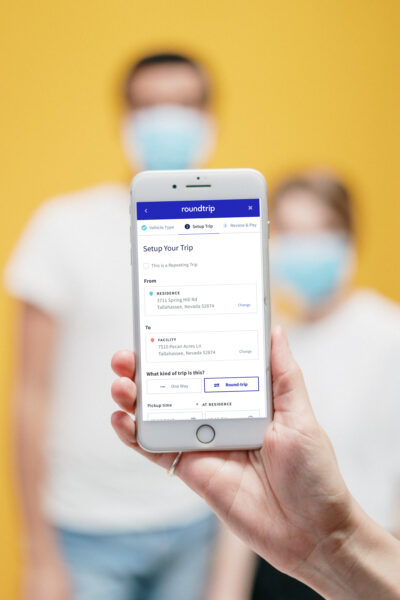Recent vaccine distribution has given the world a glimpse of hope in the fight against the pandemic. State and local governments are working hard to make vaccines available at pharmacies, public health centers, hospitals, and community-based organizations. Yet, those planning efforts are coming up short in one key area: how to provide transportation to people who can’t get to vaccine sites.
The current distribution strategy – largely web-based sign-ups for slots at a pharmacy – has shed light on the health access barrier among under-served communities. People do not have access to the COVID-19 vaccine simply because they can’t get a ride. Members of these communities don’t have cars, don’t drive or don’t live near public transit. Coordinating rides from family and friends has become extremely difficult as resources become scarce, and people isolate themselves by necessity. The health of these communities depends on community education, outreach, and reliable transportation.
Roundtrip has launched a Vaccine Access Program that helps healthcare professionals coordinate rides to and from vaccination sites for members of low-income and at-risk communities.
The Roundtrip Vaccine Access Program includes the following:
- Rapid 2–4 week implementation and onboarding
- Direct integration to rideshare services
- Supporting network of medical sedan, taxi, and wheelchair van providers
- SMS text messages to riders to confirm ride details and second dose reminders
- Ability to view and export all ride data for state/local vaccine coordination teams
“It’s important that these communities have the option of safe and reliable transportation to access the vaccine. We are here to help in any way we can to get our communities vaccinated and eliminate the health inequities that we see – and the media reports on – almost daily” says Roundtrip CEO Mark Switaj.
The impacts of the virus will last well beyond the current crisis. The strain on the care delivery system from the “aftershocks” of budget cuts, staffing constraints, and declining payer reimbursement rates will continue. Roundtrip is built to help organizations manage hospital bed flow, reduce length of stay, and create capacity to treat patients. Over the past year, as health systems have battled COVID-19 patient census surges, mobilized testing efforts, and shifted outpatient appointments, patient transportation is an essential service underpinning each of those efforts. Leading institutions like ChristianaCare, Children’s Hospital of Philadelphia, and Tufts Medical Center launched Roundtrip in the middle of the pandemic. Those organizations understood the criticality of the transportation barrier and the value their clinical teams would gain with a tool for coordinating rides for their most vulnerable patients. Since 2016, Roundtrip has worked with healthcare organizations across the country to help communities in need and stands ready to help provide access to the COVID vaccine.
